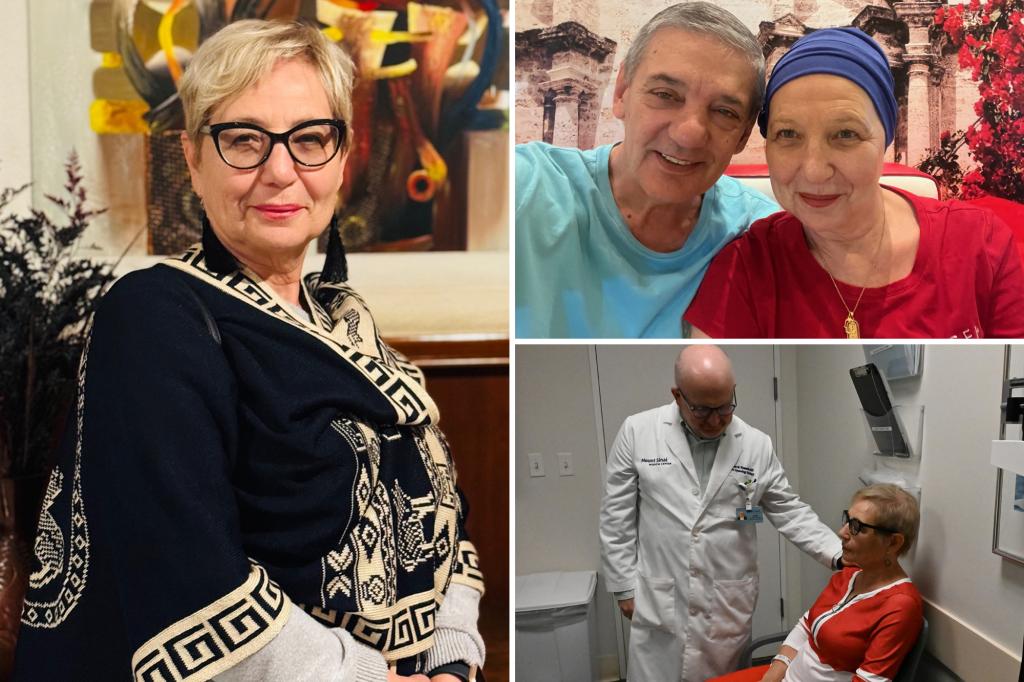A Grandmother’s Battle with Endometrial Cancer: A Story of Persistence and Hope
The Warning Sign That Changed Everything
In November 2020, Alla Feldbeyn, a Florida grandmother of four, experienced something deeply concerning – unexpected vaginal bleeding many years after she had gone through menopause. This single symptom served as a critical warning sign that prompted her to seek medical attention. After evaluation, doctors diagnosed her with Stage 1 endometrial cancer, a disease that develops in the lining of the uterus. This form of cancer has become increasingly common in the United States over the past two decades, primarily due to rising obesity rates and an aging population. Initially, Feldbeyn’s treatment seemed straightforward. She underwent a hysterectomy to remove her uterus, and her doctors assured her that chemotherapy and radiation wouldn’t be necessary. The surgery alone, they believed, had successfully eliminated the cancer from her body. For a time, it appeared that Feldbeyn had beaten cancer and could return to her normal life.
When Cancer Returns: Advocating for Her Own Health
Everything changed in 2022 when Feldbeyn began experiencing a persistent cough and unusual pain in her side. Initially suspecting gallbladder issues, she was shocked when tests revealed red spots covering her lungs. Despite these concerning findings, her doctor was skeptical that the endometrial cancer had returned and suggested it might be a different type of cancer altogether. Adding to her frustration, the doctor’s office kept rescheduling her appointments, delaying potential treatment. Unwilling to wait and sensing something was seriously wrong, the 68-year-old grandmother took matters into her own hands. She sought a second opinion and was referred to Dr. Brian Slomovitz, director of gynecologic oncology at Mount Sinai Medical Center in Miami. The difference in approach was immediate and dramatic. “The appointment was Thursday,” Feldbeyn told The Post, “and on Tuesday, I already started chemo.” The diagnosis was grim – her endometrial cancer had returned and metastasized to her lungs, advancing to Stage 4.
The Journey Through Treatment and Clinical Trials
Feldbeyn’s treatment journey became increasingly complex as she battled the advanced cancer. She underwent lung surgery followed by three months of intensive chemotherapy. Looking for additional options, she enrolled in a clinical trial evaluating selinexor, a prescription oral medication typically used for certain blood cancers, to see if it might be effective against endometrial cancer. Due to the blinded nature of the study, neither Feldbeyn nor Dr. Slomovitz knew whether she received the actual medication or a placebo. Unfortunately, whatever she received didn’t halt her cancer’s progression. By October 2023, she discontinued her participation in the trial. The following month brought another challenge – surgery to remove a tumor from her lung that had grown dangerously close to her spine. Despite these setbacks, Feldbeyn’s determination never wavered. In 2023, she joined a second clinical trial investigating non-chemotherapeutic treatments for endometrial cancer, focusing on a more personalized approach to treatment.
Pioneering New Treatment Approaches
The new clinical trial represented cutting-edge research in cancer treatment. “In the past, hormonal therapy by itself has been used for the treatment of this disease,” Dr. Slomovitz explained. “However, the response rates are relatively low, and the duration of response is only a couple of months.” The focus has now shifted to combining anti-hormonal therapies with targeted therapies tailored to specific tumor biomarkers – essentially a more personalized treatment approach aimed at addressing both the hormonal and cellular drivers of the cancer. As part of this innovative trial, Feldbeyn takes the hormonal medication letrozole daily and receives infusions of Nab-sirolimus three times a month. This particular medication is typically used to treat a rare and aggressive form of soft tissue tumors, but had never been studied specifically for endometrial cancer patients. “The ‘nab-‘ drug delivery system is better than traditional methods because it increases effectiveness and reduces severe side effects,” Dr. Slomovitz noted. This pioneering approach offers hope not just for Feldbeyn, but potentially for many other women battling this form of cancer.
Living with Cancer and Treatment
Living with cancer and participating in clinical trials has not been without challenges for Feldbeyn. She has experienced numerous side effects from her treatments, including nosebleeds, coughing, itching, fatigue, and high cholesterol. Despite these difficulties, there is good news – her cancer has not progressed further. Now entering the second year of her clinical trial, Feldbeyn continues to work remotely as a senior director for a day program serving developmentally disabled adults. She has refused to let cancer define her life or limit her experiences. “The great news about Alla is not only her response to the therapy, but she’s definitely maintaining her quality of life,” Dr. Slomovitz shared. “She and her husband love to take cruises and they go on many trips each year. For the clinician taking care of her, this is very satisfying and what we want of our patients.” Through it all, Feldbeyn has maintained a remarkably positive outlook, viewing her participation in clinical trials as not just beneficial for herself, but as a contribution to medical knowledge that might help others.
A Message of Hope and Vigilance
Feldbeyn’s story carries important messages for others facing similar health challenges. She strongly advocates for people to take charge of their own health, seek second opinions when something doesn’t feel right, and consider participation in clinical trials. “I’m loving being a guinea pig,” Feldbeyn said, “because it can save not only your life, it can save a bunch of other people’s lives.” Her perspective is especially valuable considering that only 7% of adults with cancer in the US enroll in clinical trials each year, according to Dr. Slomovitz. Medical researchers are increasingly working to expand trial participation nationally and globally to ensure that treatments are safe and effective for diverse populations. Dr. Slomovitz also emphasizes important warning signs that should never be ignored. “We used to think that it was very unusual for endometrial cancers to recur after hysterectomy,” he explained. “We’ve learned that that’s not the case.” In fact, about 30% of endometrial cancers involve advanced disease or recurrence, making it more deadly than ovarian cancer in the United States. The American Cancer Society predicts approximately 13,860 deaths from uterine cancers and 12,730 ovarian cancer deaths this year. Particularly concerning for post-menopausal women is any bleeding – even a single spot of blood should prompt an immediate doctor’s visit. Other warning signs include pelvic or stomach pain, discomfort during urination, or abnormal vaginal discharge. Through her ongoing battle, Feldbeyn has become not just a patient but an advocate, showing that persistence, courage, and willingness to explore new treatment options can make a profound difference in the fight against cancer.













